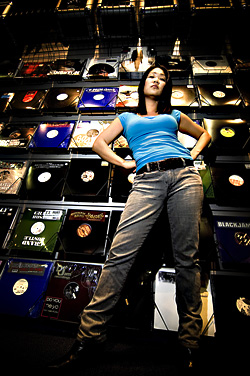When Hillary Clinton returned to her alma mater, Wellesley, last month, she told students the college prepared her to “compete in the all-boys club of presidential politics.” It was an obvious referral to the Democratic debate in which six other candidates–all men–attacked her credibility. Did she play the gender card? Hardly. To say women are at a disadvantage in politics, where all the major players are men, is stating the obvious.
If you didn’t know better, you’d think Seattle’s hip-hop scene had something in common with the political mess in D.C. At the mainstream and underground levels, hip-hop (and music overall, for that matter) is still predominantly a boys’ club. One look at the lineup for the Blue Scholars’ “The Program” (intended as a showcase for the local scene) drives home this point.
But if you were to walk into Hidmo Eritrean Cuisine the first Saturday of each month, you’d see local female DJs, MCs, breakers, and artists with a showcase all their own: Ladies First, an event with just one rule—no men on the mike. On a Saturday earlier this month, the room was full of women who use tight beats and rhymes to communicate their thoughts on issues like sexual violence and border patrol. Nobody was wearing pasties and talking up 50 Cent’s magic stick.
Local performer and activist Wendy (Onion) Carrillo introduced the idea for Ladies First in 2000, when she was an intern at Communities Against Rape and Abuse (CARA). She’d encountered a women-only break-dancing community during a visit to Oakland, Calif., and was struck by the support female performers received. Upon her return to Seattle, Carrillo checked out countless performance venues and found none were particularly female-friendly.
“I remember going to one club and seeing these boys working the crowd,” she recalls. “They had the rhythm, flow…even a band playing. It was hella dope. Then a woman went up there, and it just stopped. The band disappeared, and people stopped dancing. I heard some guys saying, ‘Damn, she messed up the flow.’ There was a very clear distinction in the level of support the men and women performers were getting.”
CARA staff and volunteers organized Ladies First that summer in Columbia City, the goal being to provide a sacred space for performers who’d been marginalized in the past. Many women jumped at the chance to be part of the showcase. But once the initial excitement wore off, it became evident that building a women-only event was going to be difficult. Years went by when the momentum was slow, even after moving the showcase to Re-bar. But with a renewed determination last spring, Carrillo and CARA moved Ladies First to Seattle’s hip-hop home base, Hidmo, hoping it would increase the event’s visibility.
Several women are prominent forces at Ladies First. Mia Beardsley, for one, is a near-constant, working diligently in the background as the DJ providing MCs with music. Beardsley, who goes by the name DJ B-Girl, fell in love with spinning records at 16—the first time she got into a nightclub and laid eyes on the DJ booth. She went on to study audio recording and engineering in college. Beardsley is aware that as a 31-year-old Korean woman, she’s hardly considered a hip-hop prototype. But her talent says otherwise. She’s responsible for laying down many local artists’ tracks, and her first full-length album, Love or Fate???, is slated for a January release.
A major presence on that album is MC Julie Chang Schulman. On the surface, Chang Schulman seems an unlikely candidate for being a hard-core advocate for hip-hop. She grew up in a Chinese-Jewish home in the suburbs of Redmond. Her initial exposure to the music came from being a “latchkey kid who watched a lot of cable TV.” Now 23, Chang Schulman teaches English at Brain Child Learning Center. Wearing thick-framed glasses and an oversized sweatshirt, she looks and behaves like a soft-spoken, bookish college student. But onstage as Julie C, that person disappears. She is a fierce MC, spitting rhymes with an intimidating assertiveness. “Fertile verbiage hurled with purpose/We making ’em nervous/They barely scraped surface/While our roots circling the earth’s cervix/Calling curtains/On these marks in our crosshairs squirming,” she shouts over the crowd.
Chang Schulman sees Ladies First as a way to promote a more accurate and empowering image of women in hip-hop. She envisions a transformation similar to that of the local food movement. “If people were to look, they would find artists in this community who regularly engage in social and human rights concerns,” she says. “Local farmers were in a similar predicament where they were ignored by consumers, until the numerous benefits for people to buy locally were revealed…the No. 1 being that the product is higher quality.”
Unfortunately, selling local women hip-hop artists to the public is like getting Bill Clinton to be monogamous. The Northwest hip-hop scene has grown steadily in the 2000s, but the droves turn out to see all-male acts like Blue Scholars and Common Market. It’s tougher to promote a show by artists normally picked as opening acts. Even tougher when those acts are ranting about male privilege. But considering that the hip-hop scenes of San Francisco, Los Angeles, and even Pittsburgh have embraced strong women as major players, there’s a long-overdue addition to Seattle’s rising scene: the girls’ club.
“There are so many factors that play into keeping women behind the scenes,” Carrillo says. “It’s like we’re supposed to remain invisible. Well, fuck that. We want to step up to the mike and express ourselves. If we aren’t given that opportunity, we’ll create it ourselves…and when we do, everybody’s going to be listening.”





